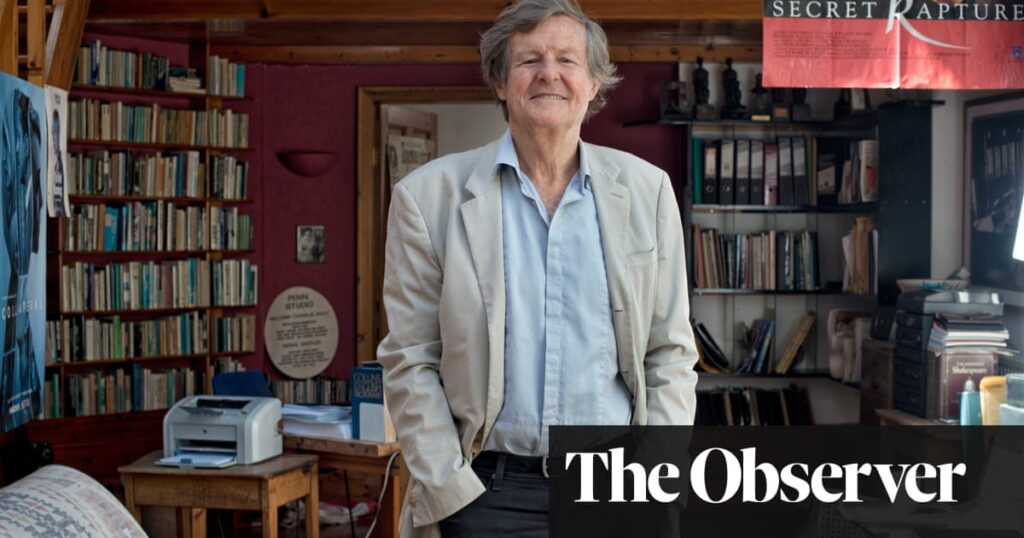[ad_1]
Sir David Hare has charted the forces and habits shaping British life for more than half a century, on stage and on screen. His work for cinema stretches from the 1985 film of his play Plenty, starring Meryl Streep, to his screenplays for Damage, The Hours and 2016âs Denial. And his string of theatrical âstate of the nationâ accounts of political and moral dilemmas, with hits such as Pravda, starring Anthony Hopkins, The Absence of War, starring John Thaw, and Amyâs View, with Judi Dench, have regularly set the cultural agenda.
But now, at 77, Hare has revealed he is to seriously step up his work rate because he fears that, for him, it is already âfive minutes to midnightâ and so he has limited scope remaining to tell important stories.
The leading playwright and Bafta-winning director now has three new dramas in production and plans for more. âI have written three new plays that are going to be on in different places and I have done that partly because of my sense that I donât have much time. I am trying to write a lot of stuff while I can,â he said.
Among the new work is a play, Grace Pervades, about the Victorian actor Henry Irving, played by Ralph Fiennes, alongside other projects on issues that may include the migrant crisis and the gangs that profit from it and a possible look at the Westminster gamesmanship he believes now dominates party politics.
Hare said he is still repeatedly drawn to stories about Britain, rather than America. He is worried, he added, about the growing distrust of experts, whether doctors, scientists, academics or engineers.
It is a topic close to his heart, as he releases in November a podcast version of his acclaimed one-man play, Beat the Devil, the work that told of his personal struggle both to understand and to survive the first wave of the Covid epidemic.
Hare said he suspects the new podcast, available on Audible, might deliver a cathartic jolt, taking listeners back to a painful period which damaged families and altered Britain politically for ever by undermining trust in government and highlighting the underfunding of the National Health Service and the care system. âThere is a movement out there today that pretends the lockdowns were not necessary,â he said. âBut I want people to remember how incredibly dangerous the illness was for some people at that early stage and that it was science and medicine that got us out, by solving something that had initially bewildered and confounded them all. The myth is that we didnât need saving and that a first natural cull of the weakest would have been fine. People can express that opinion, but it is wrong. It was science and medicine that came to our rescue, just as it is always learning that has eased human suffering over the decades.â
Incensed by Kemi Badenochâs recent suggestion that the seriousness of the âpartygateâ incident was overblown, Hare argues it was âone of those massive political moments that resulted in a huge loss of trust in all politicians, sadlyâ. He remains convinced that âthe fact that No 10 had installed a wine fridge and had wine Fridays, while the rest of us were trying to stick to the rules, was very damagingâ.
âBeat the Devil came out of a three-minute interview I gave on BBC Radio 4âs Today programme when they asked me to describe the illness. I wanted to make the point that at first the scientists and doctors did not really know what it was or how to treat it. There was a feeling of slight hysteria and ignorance, with physical signals doctors had depended on for centuries no longer applying.
âWe now know that most people died when the virus got to their lungs and gave them pneumonia. Luckily, I was instinctively flooding my body with water, and I think that helped me recover.â
after newsletter promotion
The stage premiere of Beat the Devil, with Fiennes in the role of the playwright, reopened at Londonâs Bridge Theatre after lockdown for a limited, socially-distanced audience. It recounted how Hare had fallen ill on the March day that Boris Johnsonâs government first limited social interactions.
It recalls Hareâs perplexing symptoms and the delirium that mixed his nightmares with the political mis-steps he was witnessing. The Observerâs critic Susannah Clapp praised Nicholas Hytnerâs original production for shining a light on a regime âtoo late locking down, slow to supply PPE and shuffling people from hospital to care homeâ.
A year ago in New York, Hare performed the monologue at the Public Theater and he now does the same for the podcast, hoping to express âthe rage and urgency I felt during this harrowing timeâ.
Hare has previously performed his own works, Via Dolorosa and Wall, both about the conflict between Palestine and Israel. He believes, he said, that he has also managed to write works that tackle three key events in British history. First, his verbatim play Stuff Happens, on the diplomatic lead-up to the Iraq war, then The Power of Yes, about the 2008 financial crisis, and finally, Covid in Beat the Devil.
âLooking back, now I think I was right to chose these as the significant issues,â he said.
[ad_2]
Source link

